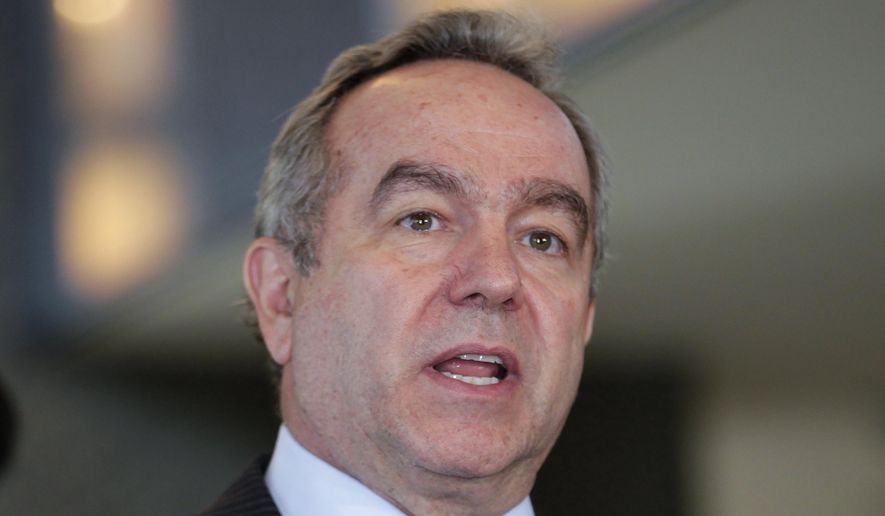A version of this story appeared in the daily Threat Status newsletter from The Washington Times. Click here to receive Threat Status delivered directly to your inbox each weekday.
Asian governments are increasingly concerned by growing nuclear threats posed by China, North Korea and Russia, and a U.S. extended deterrence is key to preventing the emergence of new nuclear-armed states in the region, Deputy Secretary of State Kurt Campbell said on Wednesday.
Some nations in Asia also could decide to build nuclear arms based concerns about “where the United States is headed,” Mr. Campbell said in remarks to the Hudson Institute, noting regional concerns about the viability of the U.S. nuclear umbrella or extended nuclear deterrence protections.
The U.S. has agreed to defend both South Korea and Japan with its nuclear forces to deter any nuclear attacks on those countries, and also to persuade them not to build their own nuclear arsenals.
To assure the South Koreans, the Biden administration concluded the Washington Declaration last year. The declaration seeks to bolster nuclear deterrence on the tense and divided Korean Peninsula, Mr. Campbell said.
Toward Japan, which was bombed with U.S. nuclear weapons at the end of World War II, the administration is engaged in talks on extended U.S. deterrence, Mr. Campbell said.
“I believe that we will be taking steps in time to have also trilateral engagements on these topics as well,” he said. “It is essential, we believe, in the current environment to take the necessary steps to support a strong American nuclear extended deterrence reassurance message, generally.”
U.S. nuclear guarantees in Asia are a key element for maintaining peace and stability and countering what he termed “nuclear reconsideration” by regional states that might develop nuclear arms.
“In truth, if any one country chose to break out, I think you would have possibly a chain reaction that would be deeply concerning,” he said, adding that a critical element of American foreign policy is reassuring regional leaders on the U.S. nuclear commitment.
Japan has an extensive civilian nuclear infrastructure that analysts say could be used to rapidly transition into producing nuclear weapons.
Mr. Campbell said China’s large-scale nuclear forces expansion is the first danger that is producing “anxiety in the Indo-Pacific” over increased nuclear threats, an expansion that Mr. Campbell contended is “not discussed enough.”
“China is in the midst of one of the largest nuclear buildups in history,” he noted. “This is not ‘maybe,’ or aspirational. These are real efforts that will yield a substantial increase in the Chinese nuclear force in under a decade.”
Also of mounting concern are provocations and continuing nuclear weapons developments by North Korea and recent direct threats by Russia to use nuclear arms in its war with Ukraine, he said.
So far, one the United States’ most important successes in region has been “that a large number of countries in the Indo-Pacific — but also elsewhere who have the capability to build nuclear weapons — have chosen not to,” Mr. Campbell said.
The deputy secretary said that after the U.S. defeat in Vietnam several states, including military-dominated governments in South Korea and Taiwan, quietly considered building nuclear weapons and delivery systems for their own protection.
North Korea nuclear and missile forces have expanded sharply in recent years with Kim Jong-un’s regime announcing that it would no longer engage in talks to end its strategic weapons programs.
Now, “it’s clear that [North Koreans] are determined to create greater capability in a number of areas, and to refine capacity, whether it’s long-range ballistic missiles or the like,” he said.
The danger is increased by what Mr. Campbell said were increasingly provocative steps by North Korea that are raising concerns among the Japanese and others.
“It’s not only their missile launches, but their determination to provide capability to Russia in ways that really affect the battlefield situation in Ukraine,” he said.
Russian nuclear threats also rattled the region by closing what is seen as a gap between the use of conventional forces and battlefield nuclear weapons. The Russian threats are “deeply concerning” to the U.S. and other nations, Mr. Campbell said.
• Bill Gertz can be reached at bgertz@washingtontimes.com.




Please read our comment policy before commenting.